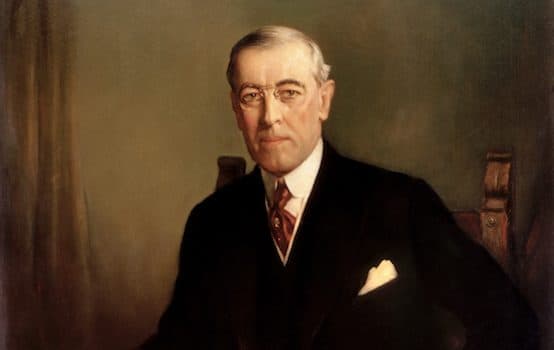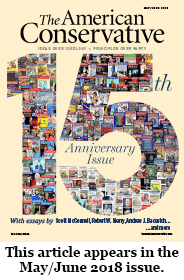
The Moralist: Woodrow Wilson and the World He Made, Patricia O’Toole, Simon & Schuster, 656 pages
The president was intent on a public patriotic celebration. It was important, he said, to “give significant expression to our thoughtful love of America.” He marched at the head of a parade past cheering tens of thousands of citizens who lined Pennsylvania Avenue from the Capitol to the White House. Later that day the president traveled to the Washington Monument, where he gave a speech that denounced an unnamed ethnic group. He said that it “must absolutely be crushed” before it could further subvert America and its influence abroad. He urged Americans to make it clear that “loyalty to this flag is the first test of tolerance in the United States” and demanded that his political party pass a plank making it clear that anyone who was a real American would agree with his course of action abroad and at home.
Thus Woodrow Wilson kicked off his campaign for reelection in June 1916. “Together, the speech and the plank,” writes Patricia O’Toole in her excellent new biography The Moralist, “proposed to abolish the Constitution’s guarantees of free expression and free assembly. Equally startling was the fact that no one in the mainstream press protested the demagoguery.”

Nearly a year later, after America entered World War I, Wilson went on to establish the Committee on Public Information, whose missions were censorship and propaganda to help persuade Americans that they faced an evil empire in the form of Wilhelmine Germany. Meanwhile, Wilson’s attorney general, Thomas Watt Gregory, locked up suspected spies and subversives. Gregory also oversaw a voluntary American Protective League. To make the world safe for democratic liberation, Wilson was prepared to suspend liberty: “If there should be disloyalty,” he declared, “it will be dealt with a firm hand of stern repression.”
Like not a few past national American leaders, Woodrow Wilson has come under closer inspection for his flaws in the past few years, including at his beloved Princeton University, where the Woodrow Wilson School has wrestled with his legacy on, among other things, race relations. A 10-member committee examined the matter of renaming the school. It decided that his views “clearly contradict with the values we hold today,” but concluded that expunging his name was not a good idea. There is also a Woodrow Wilson High School in the nation’s capital, but for now there does not appear to be a movement to alter its designation.
For many years, it was conservatives who dinged Wilson. Perhaps his most virulent detractor was H.L. Mencken, the sage of Baltimore. He took an almost lascivious pleasure in dismantling Wilson, referring to him as Moses and scorning his oratory for “its ideational hollowness, its ludicrous strutting and bombast, its heavy dependence upon greasy and meaningless words, its frequent descent to mere sound and fury, signifying nothing.” But later conservatives, such as Richard M. Nixon, admired him, and George W. Bush sounded very much like Wilson in his second inaugural address, when he proclaimed, “It is the policy of the United States to seek and support the growth of democratic movements and institutions in every nation and culture, with the ultimate goal of ending tyranny in our world.”
What to make of Wilson’s fascinating and influential presidency and life? O’Toole offers a fair-minded portrait of a vain moralist and political visionary whose certitude could exceed his judgment. She chronicles Wilson’s rise from the presidency of Princeton to becoming governor of New Jersey to president in the quadruple-contested election of 1912. Absent the Bull Moose candidacy of Theodore Roosevelt, which crippled his erstwhile protege William Howard Taft, Wilson would probably never have become president. After he won, however, the rectitudinous Wilson was able to give full vent to his crusading impulses in both domestic and foreign policy.
Thomas Woodrow Wilson was born on December 28, 1856, and grew up in Augusta, Georgia. His father, Joseph, a Presbyterian minister, carefully instructed his son in grammar and syntax, and Woodrow later referred to his father as his greatest teacher. “From his father,” writes O’Toole, “Tom had learned that great oratory was closely reasoned and deeply felt as well as pleasing to the ear.” At Princeton he studied history and philosophy, ransacking the past for lessons about the present. He also had blank calling cards upon which he inscribed, “Thomas Woodrow Wilson, Senator from Virginia.” At Princeton he scored an early coup in his senior year when he successfully submitted an essay to the International Review, which was edited by Henry Cabot Lodge. The piece called for cabinet government in the United States, a sign of his desire to import elements of the British parliamentary system into American politics.
Wilson had a heroic conception of politics that looked with disdain upon the grubby pols cutting backroom deals. He wanted men of influence to set the terms of debate, much as he believed they did in Great Britain, where Gladstone and Disraeli vied to climb the greasy pole. In 1885, Wilson published a book called Congressional Government in which he expounded upon his belief that the power of the presidency had become emasculated by an overly powerful Congress. In 1899, after America made its first stab at establishing its own empire, Wilson declared that strong presidents were imperative: “When foreign affairs play a prominent part in the politics and policy of a nation,” he wrote, “the Executive must of necessity be its guide…”
Armed with a Ph.D. from Johns Hopkins, Wilson ended up returning to Princeton, where he became its president by 1902. Now he sought to create his own little empire. He hired 50 young preceptors who, like the tutors of Oxford and Cambridge, were supposed to elevate standards at Princeton, and he embarked upon a grand plan to build quadrangles, akin to those at Oxford and Cambridge, that would sideline the famously snobbish eating clubs such as Tiger Inn and Cap and Gown. He wanted to create a new sense of academic community. The alumni revolted. Wilson, never willing to compromise in any way, lost the battle.
His next crusade was in 1909 over the location of a long-delayed building for Princeton’s graduate school. Andrew West, the dean of graduate studies, thought it should be built near the university golf course. Wilson disagreed. He wanted it located centrally amid the hustle and bustle of the undergraduates. For Wilson, who could not bear to see his precious Princeton sullied by any vision other than his own, the stakes could not have been higher. He embarked upon a ferocious battle. But the affable West, who enjoyed close relations with the wealthy alumni that were going to fund the project, won out.
With his Princeton career at a dead-end, Wilson looked for an exit. In 1910, with the backing of the Democratic machine, he capitalized on his national reputation as a reformer to run for governor of New Jersey. Wilson easily won and was quickly viewed as presidential timber. After only four months as governor, O’Toole reports, Wilson embarked on a 9,000-mile speaking tour to the West Coast and back. His message about what ailed America was as clear as it was direct: “the control of our politics, therefore our life, by great bodies of accumulated and organized wealth.” In 1912 he rode the wave of progressive indignation against the trusts to capture the Democratic nomination. The New Freedom was his credo, as against TR’s New Nationalism. O’Toole perceptively notes that Wilson performed best on a stage. “He had studied elocution as diligently as any actor,” she writes, “and without seeming to raise his voice could make himself heard by a crowd of fifteen thousand even in a hall with poor acoustics. A genius at the harmonics of political speech, he could easily work idealism and self-interest into the same chord, and he had the rare ability to stir emotion even as he appealed to reason.” On the personal level, however, he always had trouble. The journalist William Allen White recalled that when he first met Wilson, “the hand he gave me to shake felt like a ten-cent pickled mackerel in brown paper.”
Wilson approached the presidency, in many ways, as an amplification of his previous duties at Princeton. Once more, he would be the great reformer. But Congress would prove to be his trustees, reining in his grand ambitions. From the outset, Wilson believed that he could pursue a morally correct foreign policy that would set wrong aright. He told a British envoy, “I am going to teach the South American Republics to elect good men.” His great antagonist Henry Cabot Lodge, however, saw from the outset that Wilson was “extraordinarily green” when it came to dealing with foreign nations.
When it came to entry into World War I, Wilson temporized. Eventually, the British naval blockade of Germany prompted Kaiser Wilhelm to authorize unrestricted submarine warfare. O’Toole deftly recounts the complicated diplomatic maneuvering that Wilson engaged in to try and avoid becoming entangled directly in the Great War. Even as Wilson’s ambassador to the Court of St. James, Walter Hines Page, pushed for intervention, Colonel Edward M. House sought to serve as a kind of honest broker between the British and Germans to effect an end to the hostilities. O’Toole is not much impressed by House’s performance, which she depicts as consisting of naïve diplomatic blunders. But House did also create The Inquiry, a group of scholars led by Walter Lippmann, that attempted to prepare the administration for the postwar negotiations and became the basis for the Council on Foreign Relations.
Throughout, Wilson’s pacific aims could not have been more ambitious. Wilson may already have intervened militarily in Veracruz in 1914, in Haiti in 1915, and in the Dominican Republic in 1916, but he always saw himself as a man of peace. In May 1916, he delivered a speech in Washington that sought to reorient American foreign policy and prefigured much of his later diplomacy. He called for a community of nations and for collective security. “Most radical of all,” O’Toole writes, “was his abandonment of isolationism, the first principle of U.S. foreign policy.” In April 1917, after Russian Tsar Nicholas II was toppled from power, one of Wilson’s last remaining objections to entry into World War I was removed. Now he could fight for democracy with democracies.
But as hubris is usually followed by nemesis, so Wilson found himself checked by November 1918, when the Democrats suffered a crushing loss in the midterm congressional elections. After he returned from France and the protracted peace negotiations, Wilson was wholly convinced that it was imperative to create a League of Nations and that the covenant had to be ratified in toto, including Article X which stated that “The Members of the League undertake to respect and preserve as against external aggression the territorial integrity and existing political independence of all Members of the League.”
This Henry Cabot Lodge and other Republicans would not endorse. Lodge did not attack the treaty frontally but wanted to load it down with reservations that he reckoned Wilson would not accept. When the French ambassador assured Wilson that it would not pose a problem for France, Wilson responded that he would “consent to nothing. The Senate must take its medicine.” It was the battle of the quads all over again. Wilson, refractory and pedantic, simply could not even contemplate a compromise. He had banished House in 1919 and became ever more isolated and convinced of his own infallibility. He embarked upon a trip across the country to rouse support for the treaty but ended up wrecking his fragile health. He had succeeded not only in paralyzing his diplomacy but also himself.
Despite his incapacitation and long convalescence, which saw his young second wife, Edith Bolling Galt, essentially run the nation, Wilson flirted with the idea of trying to capture the nomination for an unprecedented third term. He saw himself as indispensable. Freedom and peace depended on another term. Party elders put the kibosh on that. The moment had arrived, as it were, for regime change in the Democratic Party and the doughty governor of Ohio, James M. Cox, got the nod. His running mate was the young Franklin D. Roosevelt, assistant secretary of the Navy. Cox campaigned for the League of Nations, but his Republican counterpart Warren G. Harding vowed that it was time to return to “normalcy.” Harding won.
Wilson took the election news serenely but remained as flinty as ever. When Attorney General A. Mitchell Palmer recommended in January 1921 that Wilson commute the great socialist leader Eugene V. Debs’s sentence, whom he prosecuted for delivering an anti-war speech in Canton, Ohio, he refused. “Wilson,” O’Toole writes, “knew that he would be denounced by champions of free speech but did not care.” To the last, Wilson, who died in 1924, remained unbending in his resolve to smite anyone who dared disagree with him. It was Harding who commuted Debs’s sentence in December 1921.
Jacob Heilbrunn is editor of The National Interest.
Sourse: theamericanconservative.com






